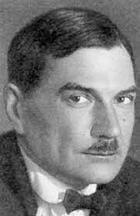
Evgueni Zamiatin (Lebedián, 1884-1937, Paris) studied naval engineering at the Saint Petersburg Polytechnic Institute. Arrested during the 1905 Revolution, he managed to return clandestinely to Saint Petersburg until he settled in Finland, where he completed his studies. Upon returning to Russia, he was arrested again, for which he had to go into exile in 1911, being amnestied in 1913. During the First World War he published In the Fifth Hell, an anti-war novel that was soon censored by the Tsarist authorities. Disillusioned with the 1917 Revolution which he initially supported, he published the short stories Los insulares and El pescador de hombres. But it was his masterpiece, The Dystopia We (1921), for which he rose to fame when, after being banned by the Soviet authorities, it was first published in the United Kingdom, in 1924, albeit incompletely, and three years later in Prague. Worldwide recognition came with the publication of the work in Paris in 1929, receiving the praise of Aldous Huxley and George Orwell, authors of both novels of the dystopian genre. Zamiatin tried to go into exile on several occasions, escaping both censorship and financial straits. After obtaining the necessary permission, alleging health reasons, he was finally able to emigrate to Paris in 1932, after a brief stay in Prague, where he died in 1937.





